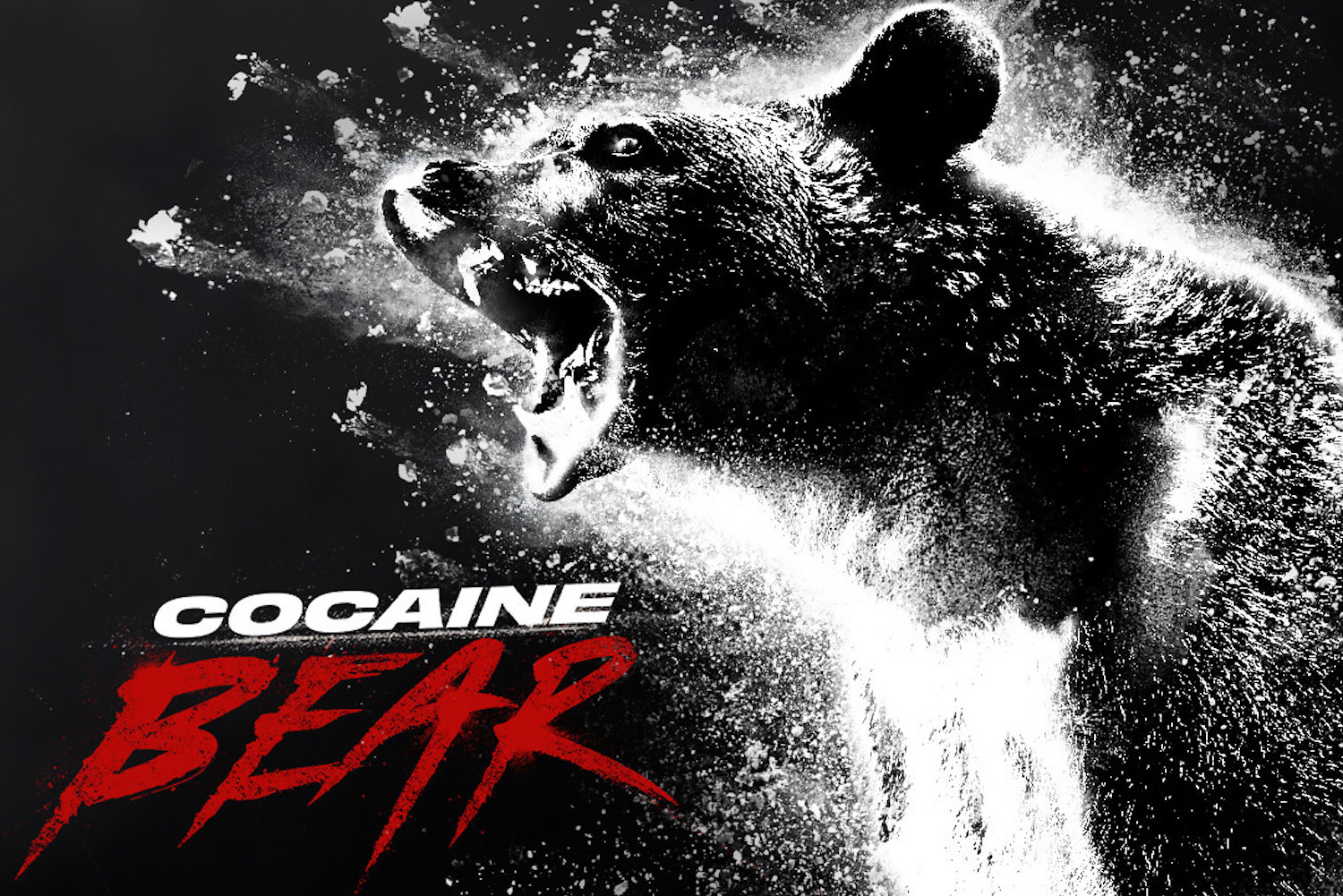In 1985, a black bear ingested millions of dollars’ worth of cocaine that was abandoned in the Tennessee woods after a drug-smuggling operation gone wrong. The coke was lost in mid-September, and the bear died sometime between then and late December, when its body was discovered in northern Georgia. There’s a decent chance that at the moment of the bear’s death, the number one movie in America was Rocky IV, a glorified (and self-glorifying) Rocky clip show. Other big titles in the December 1985 box office were Spies Like Us, with Chevy Chase and Dan Aykroyd reuniting for an overblown adventure guided by scandal-plagued director John Landis; Jewel of the Nile, a joyless reprisal of Romancing the Stone; and Santa Claus: The Movie. If these films are any indication, it was a time of mindless excess.
The new movie, Cocaine Bear, is a fanciful, dark-comic extrapolation that a coke-addled bear was running around the woods for a few days in 1985. It doesn’t really try to capture the feeling of a movie from that era, apart from the mindlessness and the merest dash of a kids-on-perilous-adventure subplot that briefly and ineptly echoes Stand By Me. The movie is more interested in the generic 1985 — cartoony fashions, recognizable radio hits — of The Wedding Singer, and that’s not the only ’90s thing about it. The movie also recalls that decade’s post-Tarantino ensemble crime farces, with self-consciously tangential dialogue and “unexpected” bursts of ultraviolence. Cocaine Bear tops itself off with moments out of mid-2000s early meme culture, when a movie like Snakes on a Plane could become an internet sensation by its title alone; the filmmakers can’t resist throwing in some cutesy verbal anachronisms, as if winking at a nonexistent internet following. The resulting movie is a trip, but probably not as intended. It’s like being annoyed in a time machine.
But it didn’t have to be. The many stars on display here aren’t generally known for irritating audiences. Keri Russell plays a mom searching for her young daughter (Brooklynn Prince, from The Florida Project) who has cut school to visit a local waterfall with her best friend Henry (Christian Convery). She crosses paths with an ornery park ranger (Margo Martindale), and, eventually, two criminals (Alden Ehrenreich and O’Shea Jackson Jr.) tasked with retrieving the misplaced drugs at the behest of their short-fused boss (Ray Liotta, in one of his final roles). They, and others, run afoul of the coked-up bear, who primarily wants more cocaine but will gladly rip apart some humans in the meantime. Cocaine Bear is a kinda-sorta slasher movie, in that it introduces many characters for the sole purpose of gorily killing them off, and a kinda-sorta comedy, in that the characters often make mugging faces before they die. But it’s not especially scary, and it is emphatically, stridently, insultingly unfunny. Only a few scraps of mean-spirited entrails remain.
Bears Are Taking Selfies Now. What Could Be Next?
Selfie Bear is the new Cocaine Bear, apparentlyThe movie was directed without much rhythm by Elizabeth Banks and written with what sounds like spec-script smarm by Jimmy Warden. It’s fascinating to clearly understand what they were going for without seeing much evidence that they could pull it off. This is supposed to be a farce of colliding fates, somewhere between the Coen Brothers and Barry Sonnenfeld, but has nothing to offer in that realm apart from the occasional chuckle or satisfying gore-induced shudder of disgust. Banks has given confidently funny performances in plenty of movies (Wet Hot American Summer, Role Models, Our Idiot Brother) and directed a harmlessly enjoyable Charlie’s Angels reboot. She’s got decades in the business. But the filmmaking here is anything but sure handed. Characters are introduced with context-light cuts, information is awkwardly pasted into the middle of scenes and the irreverent banter sometimes feels like it was written by a chatbot to circumvent copyright concerns. Why else would two characters debate about the rules and strategy involved when playing 20 questions?
For all of its derivative details, Cocaine Bear is oddly detached from any kind of cultural commentary, or even simple referentiality. This is a movie that casts Isiah Whitlock Jr. as a weary cop without much other characterization (yet doesn’t have the wherewithal to have him break out his signature “sheeeeeeeeeit” catchphrase) and casts Ray Liotta without giving him so much as a single memorable chance to pop off with his trademark intensity. The movie appears to reconstruct a full spectrum of irony — with detached ’90s attitude at the center, looking back at ’80s kitsch and forward toward ’00s poptimism — only to generate little idea of what, exactly, it’s being so cheeky about, what it’s ironically celebrating or sneakily mocking. Is this nature’s accidental revenge against pure American excesses? An ill-fated attempt to control what cannot be contained? The movie resists interpretation in favor of shtick. It can only dispose of its characters (without ever stooping so far as to create the mood or atmosphere necessary for true horror), grin at its own outrageousness (while still peddling some mush mouthed late-breaking odes to the bonds formed by family and friends), and repeat those moves so listlessly that its 95 minutes feel close to endless. Maybe it’s not fair to dismiss this as an ’80s throwback in costume only. It’s got the slick emptiness and misplaced confidence to compete with 1985 at its worst.
This article was featured in the InsideHook newsletter. Sign up now.
